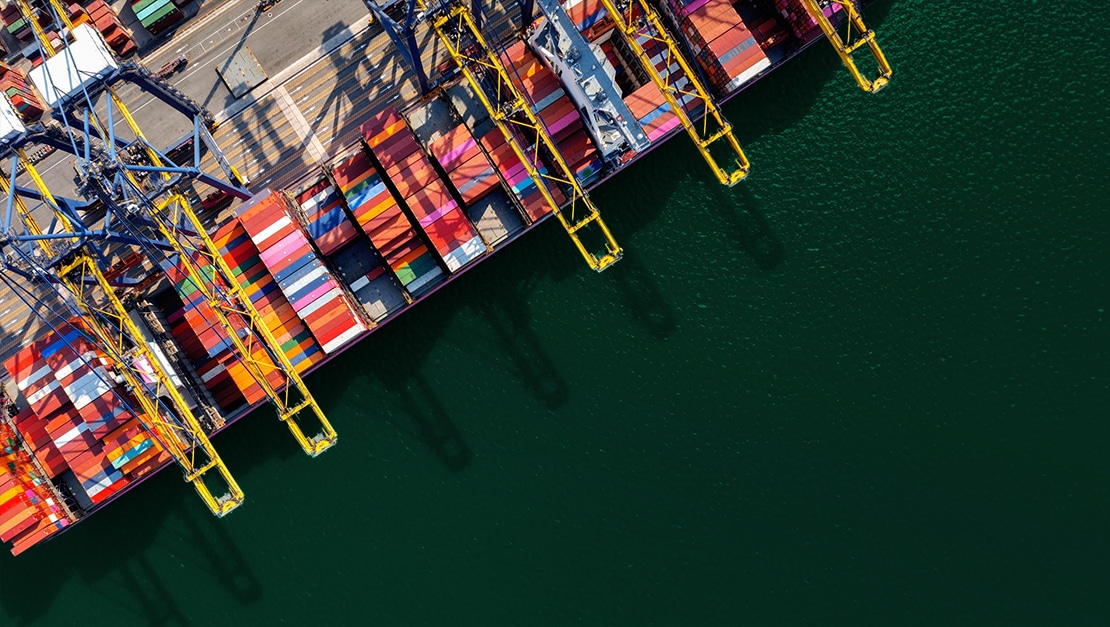Artificial intelligence (AI) can offer companies a distinct competitive advantage when it comes to optimizing their supply chains. As an emerging transformative technology, AI helps companies utilize advanced algorithms and large-scale data analytics to streamline supply chain workflows, automate tasks, and enhance decision-making processes.
By leveraging AI-powered technologies, supply chain managers can more accurately forecast needs, manage inventory, optimize transportation, and plan according to demand. These AI-driven systems help companies cut down on costs, improve agility, and enhance customer satisfaction.
Right now, AI is already being used in different facts of supply chain management, such as demand forecasting and warehouse management systems. However, looking towards the future of this quickly evolving technology, there are many ways AI can be used to propel supply chain management even further. In this piece, we’ll examine some of the current trends that point to the future of AI in supply chain management.
How AI in Supply Chain Management Is Being Used Today
Before we examine different AI trends that will play a part in the future of supply chain management, it’s important to establish how supply chain technology is already used today. With so many different applications, AI is changing the way supply chain management is handled. Here are several current uses for AI in supply chain management:
- Demand forecasting: AI is being used to analyze historical data and market trends to more accurately forecast demand, enabling companies to reduce stockouts or overstocking
- Inventory management: With AI, companies are optimizing inventory levels by analyzing real-time data to minimize carrying costs and improve order fulfillment
- Logistics and route optimizations: AI algorithms are used to optimize transportation routes taking into consideration factors like traffic, weather, fuel costs, and more to reduce costs and improve delivery times
- Predictive maintenance: Companies are monitoring the health of different warehouse equipment with AI to predict when the next round of maintenance is needed to help prevent breakdowns and downtime
- Customer service: AI-powered chatbots are offering real-time customer support such as responding to order inquiries, resolving issues, and reducing customer response times
- Warehouse automation: AI-powered robots can help workers automate monotonous and physical tasks like picking, packing, and sorting to increase supply chain efficiency and make workflows safer
- Sustainable logistics: By using AI to cut down on fuel use, streamline workflows, and reduce the amount of wasted resources, companies are making their supply chains more sustainable and environmentally friendly
5 Future Trends in AI and Supply Chain Management
Of course, there’s no way to predict the future. The supply chain industry can evolve in several different ways in the next five or ten years and beyond. However, looking at the technologies in use today and the emerging ones, we can speculate on how supply chain management is likely to look in a decade or two.
What’s almost certain is that, given its prevalence today, artificial intelligence and its related technologies are likely to have a big impact on the future of supply chain management. Based on existing trends, here’s a look at what we can expect from AI in supply chain management in the future.
1. Adoption of Advanced AI Technologies
As more and more companies adopt high-level AI systems that rely on machine learning (ML), deep learning, and natural language processing (NLP), we’ll begin to see more sophisticated data analysis and by extension, decision-making. Here’s how:
- ML’s ability to analyze huge quantities of data to identify trends is likely to improve accuracy when it comes to forecasting inventory needs
- Artificial Neural Networks (ANNSs) using deep learning and ML techniques will be better able to detect anomalies, assess predictive maintenance needs, identify risks, integrate data, and more
- NLP will play a bigger role in enabling better communication between team members and between employees and machines, making workflows more efficient
2. Better Integration with the Internet of Things (IoT)
IoT devices like sensors and trackers allow for real-time monitoring of goods in a supply chain. When paired with advanced AI algorithms, these devices can work together to optimize routes, cut down on delays, and improve supply chain visibility. There are several different ways that emerging IoT technologies may be used in the future:
- New IoT technologies like digital twins give companies the ability to build a digital representation of a physical or even conceptual product. With digital twins, companies can create virtual representations of their supply chain processes to simulate behavior and test different scenarios.
- Drones equipped with IoT devices like sensors are being tested to complete deliveries, with some estimating that drone-based package delivery networks could manage around 70% of urban deliveries.
3. Autonomous Supply Chain Systems and Robotics
In the future, supply chains will be increasingly automated with the use of robotics and AI-driven automation systems. AI robots can already perform tasks like picking, packing, and sorting, and as this technology advances, we’ll see even quicker and more accurate order fulfillment and reduced reliance on labor and resources. According to Gartner, by 2027, 75% of companies will have adopted cyber-physical automation in their warehouse operations. Here are some ways we may see this type of technology manifest in the field of supply chain management:
- While companies like Amazon are already leading the pack on autonomous mobile robots (AMRs), not all companies have the resources to follow suit. In the future, we can expect to see AMR technology become more accessible and widely used.
- As autonomous robots become more sophisticated, we can predict that set-up time will decrease, enabling companies to have these systems working around the clock with a higher level of quality and productivity while creating a safer work environment where employees don’t need to perform hazardous tasks
4. Blockchain Technology
In the future of supply chain management, blockchain will help companies prevent fraud, reduce counterfeiting, and improve trust with supply chain managers by ensuring secure and immutable records of transactions. Since this is a relatively new technology, it’s not widely used yet in the supply chain industry, but there are different ways we expect to see it grow in the future:
- By interacting with other emerging technologies, like IoT, AI, and smart contracts, blockchain can help organizations ensure their supply chains are even more traceable and secure
- We can expect to see more and more companies adopt Blockchain technology in their supply chain to improve tracking and traceability, like FedEx and Walmart, the latter of which is using the technology to improve food safety and tracking
5. AI-driven Hyper-personalization of Service
AI provides organizations with the ability to offer more customized experiences and recommendations to their customers. By using AI technologies to analyze customer data and preferences, businesses can better tailor their services and offerings to specific needs. Here’s how we can expect to see the use of Blockchain grow in the next few years:
- While most factories will use a one-size-fits-all approach, with the introduction of AI, opportunities for hyper-personalization will grow, enabling manufacturers to leverage ML systems to enable autonomous manufacturing adjustments that improve the customer experience
- When paired with other technologies, like AI-driven forecasting, supply chains can apply analytics to adapt to evolving customer requests more quickly and efficiently, improving supply chain resilience as AI has the potential to reduce stockouts by 50%
How aiOla is Bringing the Future of AI to Supply Chains Today
The future of AI in supply chain management is bright, but for companies looking to get ahead of the curb now, there are technologies they can adopt to start moving operations into the future. aiOla is one such technology.
As an AI-powered voice technology, aiOla enables teams to harness the power of speech and turn language into action. With aiOla, supply chain managers can gain deep insights into otherwise lost data while simultaneously automating various aspects of supply chain management.
aiOla allows logistics and warehouse teams to automate manual tasks such as inspections, order processing procedures, and others just by speaking normally. This way, companies can ensure that employees remain entirely hands-free while performing laborious tasks, making work safer for everyone.
Additionally, aiOla helps teams capture data through voice to help businesses make more informed decisions. Not only that, but aiOla’s voice technology encourages seamless collaboration between employees and machinery, leading to cost savings and fewer opportunities for error.
The Future of Supply Chain Management is Already Here
Many of the technologies we expect to shape the future of supply chain management are already available today, though some are in quite early stages. Organizations that adopt these AI-driven technologies earlier on will be able to stay ahead of the competition by learning how these systems work and adapting them to fit their needs.
With aiOla, the onboarding time is relatively low as the platform is entirely voice-based, meaning there’s almost no learning curve and the system can start optimizing your operations almost instantly.
Schedule a demo today to learn more about how aiOla can help future-proof your supply chain.








